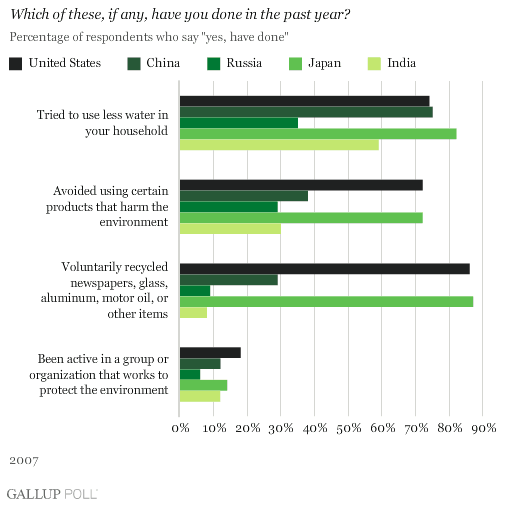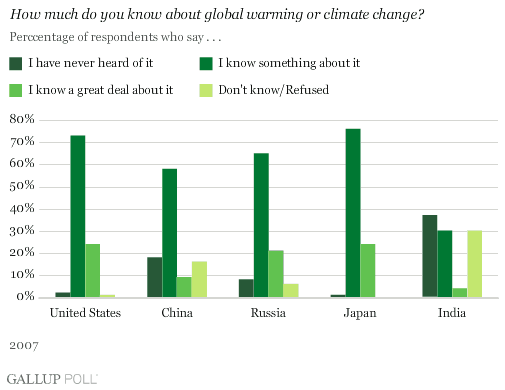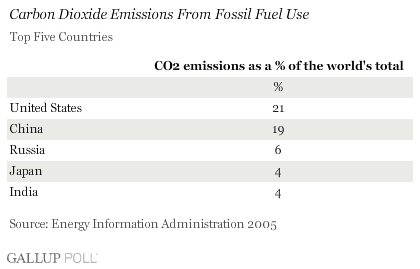WASHINGTON, D.C. -- In commemoration of Earth Day, Tuesday, millions of citizens are gathering in cities around the world to raise awareness about global warming and other environmental issues. Across the five countries that contribute more than half of the planet's total carbon dioxide emissions, Gallup finds that self-reported participation in recycling and other environmentally friendly activities varies.

According to the Energy Information Administration, the United States, China, Russia, Japan, and India together account for 54% of the world's total carbon dioxide emissions, which represent the largest share of man-made greenhouse gases. Gallup Polls conducted in 2007 show that American and Japanese residents express the highest levels of environmental stewardship.
Almost 9 in 10 Americans (86%) and Japanese (87%) say they voluntarily recycled newspapers, glass, and other items in the past year. However, the Chinese (29%) are three times less likely to say they recycled such products, and Russians (9%) and Indians (8%) are the least likely to say the same.
Strong majorities of Americans (72%) and Japanese (72%) say they avoided using certain products that harm the environment in the past year. But Chinese (38%), Indians (30%), and Russians (29%) were far less likely to report avoiding using such products.
Majorities of residents in each of these countries except Russia say they tried to use less water. Across all five countries, Japanese (82%) are the most likely to report they've tried to do this, while Russians (35%) are the least likely. The Chinese (75%) are almost as likely as Americans (74%) to report attempts at water conservation. About 6 in 10 Indians (59%) also say they tried to use less water in their household in the past year.
The Gallup Polls also reveal that of the four environmental activities asked about, respondents from these five countries are least likely to say they have engaged in community activism. However, percentages of residents who say they were active in a group that works to protect the environment varies from a high of 18% in the United States to a low of 6% in Russia.
When asked about global warming, strong majorities say they know at least something about it, except in India, where 37% of residents tell Gallup they have never heard of it. Furthermore, 24% of Americans and Japanese and 21% of Russians say they know a great deal about it.
The relationship between how much one knows about global warming and participation in "green" actions varies across the five countries. In Japan, respondents who know a "great deal" about global warming are more likely than those who know "something" about it to say they recycle (95% vs. 84%) and avoid using harmful products (82% vs. 69%). In the United States, greater awareness of global warming only prompts respondents to report being active in a group to protect the environment: 33% for those who say they know a great deal versus 13% for those who say they know something about global warming. But in China, respondents who know more about this issue are more likely to say they recycled, avoided harmful products, and were active in an environmental group, by at least 11 percentage points. In India, those who report greater levels of global warming awareness are also more likely to say they avoided using harmful products and tried to conserve water in the past year. In Russia, those who say they know a great deal about global warming or climate change are more likely than those who say they know something about global warming to report having tried to use less water in the past year, 42% vs. 34%.

Bottom Line
Overall, Gallup Polls reveal that among the top five polluting countries worldwide, in terms of carbon dioxide emissions, self-reported environmentally friendly actions vary greatly. Americans and Japanese are far more likely than those living in the other three nations to report recycling and avoiding using harmful products. Only minorities of Russians, however, say they have engaged in "green" activities. Furthermore, the Gallup Polls also show that greater awareness about global warming doesn't necessarily mean that residents in these countries were more inclined to engage in "green" activities.

Survey Methods
In the United States and Japan, results are based on telephone interviews conducted in August 2007, with at least 1,000 adults, aged 18 and older, in each country. In China, Russia, and India, results are based on face-to-face interviews conducted in August-October 2007, with at least 1,000 adults, aged 15 and older, in each country. For results based on the total sample of national adults, one can say with 95% confidence that the maximum margin of sampling error is ±3 percentage points. In addition to sampling error, question wording and practical difficulties in conducting surveys can introduce error or bias into the findings of public opinion polls.